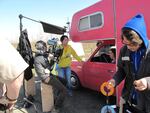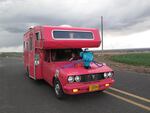
Shirlyn Wong (in yellow) directs Sydney Boyd, who plays a Las Vegas stripper with a pink RV.
Photo courtesy of Lan Wong
Four hours from Portland, in the pastoral Walla Walla Valley, Milton-Freewater could not be farther removed from New York City. But NYC filmmaker Shirlyn Wong has been making the trip for years. Her sister owns a boutique chocolate shop in town.
As soon as she was accepted into film school, Wong knew she wanted to record her impressions about the northeast Oregon on film. Her “Oregon Lens” entry, “The Mobile Stripper,” shows the uneasy bond that forms between one resident and a newcomer, a Vegas stripper who operates out of a neon pink RV.
Wong cast all the parts of the movie with actors from the Walla Walla Valley. Because she knew the area, casting wasn’t difficult.
How did you find your actors? What was the casting process?
I worked with Rich Hinz on a short film the year prior to doing “The Mobile Stripper.” I knew then that for my next film, I wanted to cast him, to the point of writing him into the script. Once the ball started to get rolling, Rich helped me organize table readings of the script and Sydney Boyd read for Veronica.
The role of the mother was one of the toughest because it required the actress to feel comfortable being in her underwear on camera. I asked quite a number of women and all of them rejected the part. It was no surprise - the area is conservative, especially the older population.
Luckily Sydney was in a local theater play that Nancy Simon was directing, and Nancy was all up for the challenge. I remember going to Little Theater in Walla Walla during a rehearsal for the play where Sydney yelled across the auditorium to where Nancy was sitting, “Would you be interested in acting in this film? You'll need to be in your underwear for one of the scenes?” And the response was as simple as, “Yeah, sure.”
Is the film based on your specific impressions of northeastern Oregon? Are there any real-life incidents that inspired it?
In 2011, during a summer break in film school, I decided that I would avoid the typical production assistant work and do something completely different. I decided to work at a small you-pick farm on the Oregon/Washington border. Every day I'd irrigate the corn, water the cucumbers, pick tomatoes and have long talks with the farmer. I loved being outdoors, seeing the Blue Mountains in the distance, and riding my bike three miles across the agricultural landscape to get home.
There was one week that the farmer's daughter came to visit. She was not what you would expect a farmer's daughter to be. She came from Las Vegas and was a woman of the night. She was friendly and gregarious, sharing stories of the Vegas life. I thought this was such an interesting contrast to this smalltown life that it would be interesting to make a story about it. Her father wasn't the happiest with his daughter's life choices, but I felt there was something intriguing and special about her. Being an outsider and feeling accepted for who you are was a point of interest for the theme of the film.
The pink motor home is a significant character in the movie too, no doubt. Where did that idea come from?
For the film, it was important to create a juxtaposition between two different worlds. One is represented by the Mobile Stripper's home, the pink motor home, and the other is the town. They are both characters in the film that are in opposition with one another. Since Milton-Freewater is an agricultural town covered in yellow golden wheat, I knew that a pink motor home zipping through it would create the right visual conflict I needed for the story. I chose to shoot the film in the late winter, because I wanted to focus on the stilted life and earthy tones that the season brings.
Besides the performers, what locations will residents recognize in the movie? What will be part of the “Mobile Stripper Tour” if this film becomes a cult classic?
We shot the film across three towns, Weston, OR, Milton-Freewater, OR and Walla Walla, WA. The agricultural landscape of Umatilla and Walla Walla Valley were instrumental to the film. But we also shot at recognizable landmarks such as Suzi's Handy Mart, a local gas station and convenient store in Weston, OR, a town made up of 670 people. There is also the local familiar abandoned Blue Mountain Mall in Walla Walla, WA. We also shot in the back house of Petits Noirs Chocolate shop, the parking lot of Walker furniture store and the Reidal Cherry Orchard in Milton-Freewater, OR. We also had the honor to shoot at a 100-plus-year-old farm house in Walla Walla.
Teresa Zorich, the assistant director, appears to be a local as well. What is her story?
Teresa is from the Tri-Cities area in Washington. I got into contact with her through a CrewSpace, a local multimedia center run at the Walla Walla public library. Jeffrey Townsend runs a weekly film club, and he was monumental in finding resources and helped connect me with some local crew. Teresa had worked as a second second assistant director on a local independent film called "Hello, My Name is Frank" and was eager to work on other local productions. Little did she know that our production was going to be really "indie" with the crew stationed at my sister's house, eating home-cooked meals and sleeping on air mattresses.

Shirlyn Wang
One of your actors ended up actually ringing people up as a gas station cashier. What happened there?
We approached Suzi's Market to do a short scene inside the convenient store. They were generous enough to let us shoot a few hours in the morning of their slowest day. They told us hardly anyone comes in during this time. This would be perfect for us since we had to do a scene by their cash register and we wouldn't want to get in the way of their business. We should have known that when you pull up a pink motor home in front of the store, that the entire town would be curious. It ended up being a really busy day with customers coming in to take a look at the action. It got so busy that the actor, Douglas Carlsen, who played the clerk, was ringing up customers left and right because there was such an overflow. It didn't quiet down much even after when we did our exterior scenes at the shop. It seemed the entire town decided to mow their lawn at the same exact time. My hunch is that they wanted to see what we were doing but trying to do it inconspicuously.
Any other funny stories about filming locally?
In one of our scenes, we wanted to have a police vehicle pull the pink motor home to the side of the road. There seemed to be a chance that we would be able to have a local police officer park their vehicle by the side of the road for one shot. However, when they heard the title of the film, they became concerned about the content. Understandably, we weren't able to use their vehicle, but our amazing crew quickly improvised on set. We turned our actress’ white Toyota Camry into the police vehicle by clamping on the legs of a C-stand for a ramming bumper and putting black gaffers tape on the sides for the speed stripes. Positioning the car just right as it pulled on the side of the road outside a cherry orchard, we were able to pull it off.